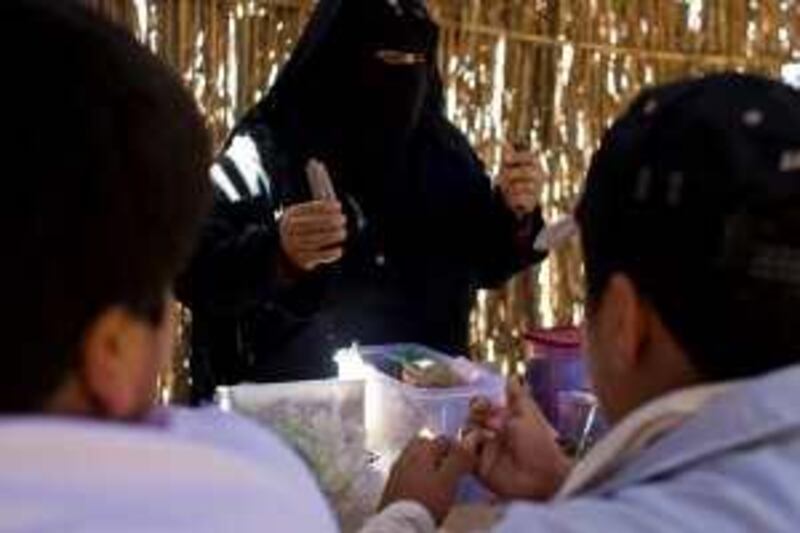DUBAI // The synchronised spins and deft skills of Yolla dancers bring cheers from a small crowd at sunset. Nearby, in a souq made from palm fronds, traditional Emirati goods such as baskets and perfumes are displayed proudly by their makers.
It is a timeless desert scene evoking the spirit of a simpler, traditional life, and only the roar of aeroplanes and the lights of skyscrapers on the horizon remind us that it is the 21st century and Dubai is a bustling modern metropolis. After the Yolla dancers bow to applause, the crowd listens attentively to a play called My Dear Country, a homage to the traditions, pastimes and customs of desert life. The children appear spellbound as they learn of the plain lives of their forefathers and the actors are showered with questions.
The dances, play and workshop are part of a programme of heritage-themed activities at the Watani family camp, a temporary village of tents and traditional buildings that closed this weekend after welcoming families and school groups for two months. Mohammed Khames bin Aboud, a history teacher performing the play, says children are amazed to learn how people once lived without modern luxuries. "The play is about civilisation now and how it has changed from 50 years ago. We show people how people survived in the desert, found water, used camels and enjoyed pastimes such as hunting. Development in the UAE has been so rapid that the younger generation have few reminders of their roots and it is important that they know their national identity."
After the play, workshops encourage the audience to learn traditional crafts such as making frames and mirrors using handwoven fabric or shells they gather by the seashore. "I can remember my grandmother making clothes and gifts by hand. It could take up to two months to make a single dress," says a workshop co-ordinator, Farida Mohammed. Kamel Sassi, an English teacher at Al Razi public school, says experiencing heritage at first hand was a more powerful learning tool than reading books. "Many of my students haven't seen or considered their heritage before so it has been a memorable experience for them."
Mohammed Ali Moussa, a teacher at the Al Shorouk private school, says the camp awakened his pupils interest in their heritage. "It is difficult in a modern classroom to give children an impression of what traditional life was like. Telling them facts or showing them drawings doesn't make much of an impact. But seeing old buildings and learning traditional etiquette and customs for themselves will stay in their minds."
Activities focus on cooking, jewellery and perfumery for girls and making models and erecting tents for boys. Saif Al Deen, 13, from Al Shorouk school, says: "We have learnt how our ancestors used to live and how important camels were to desert society. I'd rather live in modern times, though, because we have technology. Because they didn't, it meant they had to make good use of their environment."
His friend, Mustafa Mohammed Kassan, 13, says the trip made him question the extravagance of modern life. "Why does every house need four cars in the garage? We should use a camel and just have one car for special occasions." The project manager, Mohammed Alassy, says that even with the prosperity that has come to Dubai in recent years, spending time in the desert and connecting with the landscape holds an enduring appeal for local people.
"People love coming to the desert and we have welcomed around 3,000 visitors since the camp opened in January. For the first time this year we have welcomed all nationalities as we realise Dubai is a cosmopolitan city and we want to promote the country's heritage to the wider population of Dubai. Fifty years ago there was a simple culture here where people lived in harmony with their surroundings."
The tents are now being cleared, and the souq dismantled. Within days there will be few traces of the camp as the desert reclaims the dunes. But the Watani team hopes that the memories of traditional life will remain. Safia Sultan, a workshop co-ordinator, says developing a sense of national identity is not just an exercise in nostalgia but could be the key to future prosperity. "The camp has shown that the younger generation are eager to learn the skills of their elders and the lessons they learnt about living with their environment and making the most of the local resources will be important to them in their lives."
tbrooks@thenational.ae






